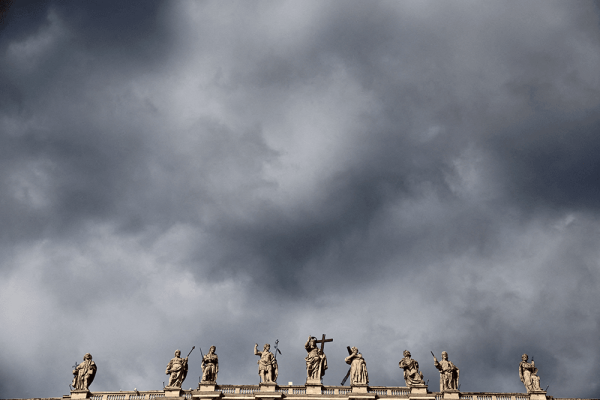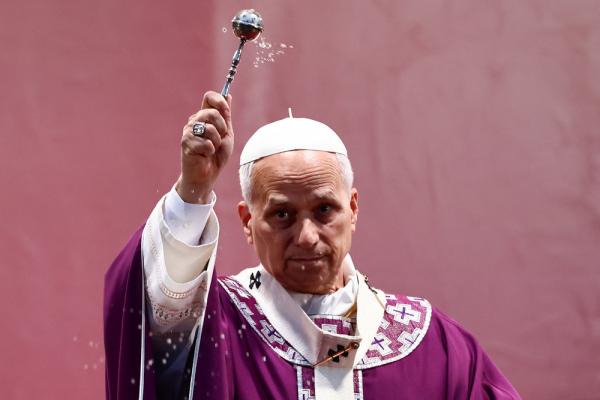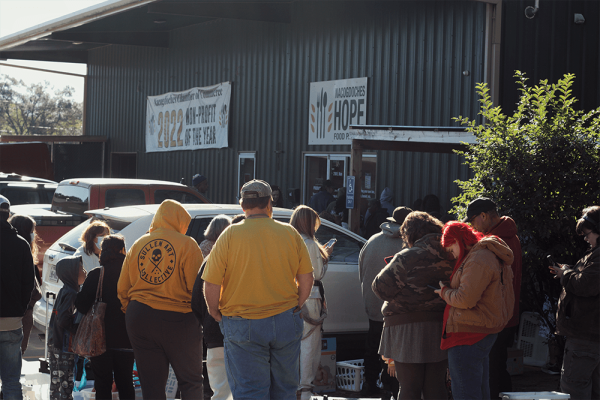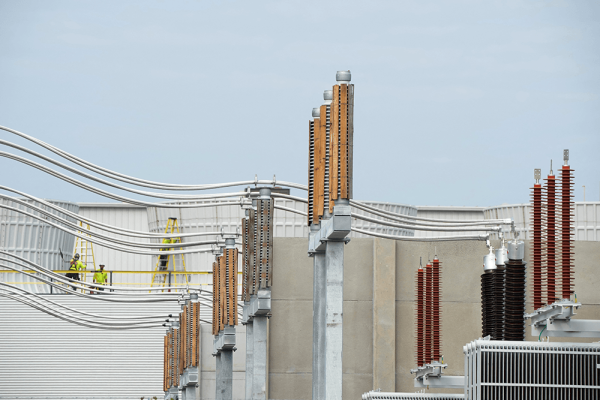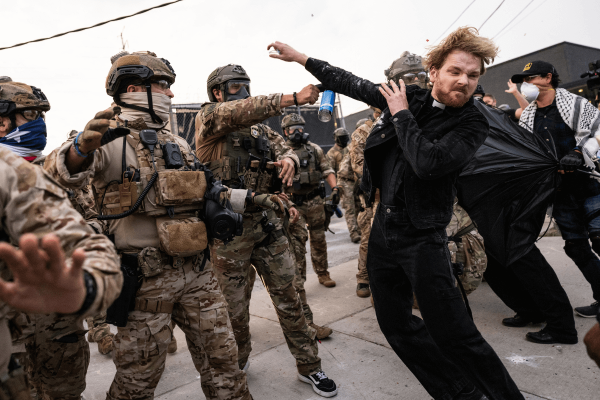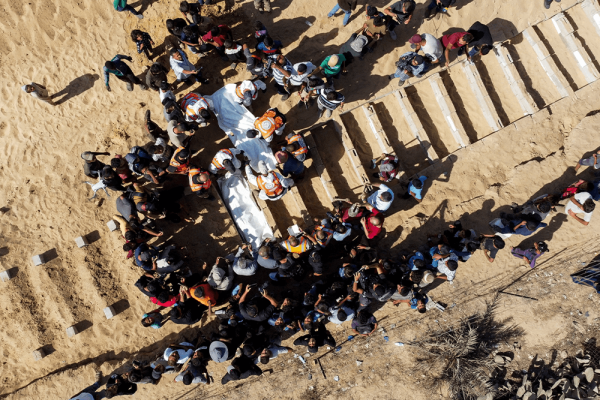Jesus may have heard words of wisdom from his mother Mary, but she did not help him save the world from damnation, the Vatican said on Tuesday.
In a new decree approved by Pope Leo, the Vatican’s top doctrinal office instructed the world’s 1.4 billion Catholics not to refer to Mary as the “co-redeemer” of the world.
Jesus alone saved the world, said the new instruction, settling an internal debate that had befuddled senior Church figures for decades, and even sparked rare open disagreement among recent popes.
Pope Leo called on Tuesday for "deep reflection" about the way migrants are being treated in the United States under President Donald Trump's administration and said the spiritual needs of those in detention needed to be respected.
Speaking to reporters in Castel Gandolfo, his residence outside Rome, the pope was asked about immigrants detained at a federal facility in Broadview, near Chicago, who have been refused the opportunity to receive holy Communion, an important religious obligation.
On Oct. 28, U.S. Border Patrol Chief Gregory Bovino sat before U.S. District Judge Sara Ellis, who had ordered him to appear in court after attorneys accused him of throwing tear gas into a crowd in the Little Village neighborhood. Bovino was selected by the Trump administration to lead its immigration raids in Chicago—dubbed “Operation Midway Blitz.”
For Deidra Harrison in Nacogdoches, Texas, the lead up to All Saints Day wasn’t what it usually is. In addition to preparing for the usual church festivals and trick-or-treaters that mark the season associated with abundant harvests, Harrison and her team of volunteers were scrambling to meet a growing food scarcity created by the U.S. Government shutdown as it entered its fourth week.
Harrison is the board president for HOPE (Helping Other People Eat) Food Pantry, one of the many food pantries and food banks seeing long lines and high turnout as 42 million Americans brace for delays to Supplemental Nutrition Assistance Program (SNAP) payouts.
As the ubiquity of artificial intelligence grows, Black spiritual leaders find themselves navigating its perils and promises.
Amid ethical concerns over the sourcing of AI materials, the role of technology in creative endeavors, and the environmental consequences of AI, there’s a significant demand for the technology among church leaders. A 2024 survey by Barna Group found that 78% of pastors are comfortable using AI to assist with marketing and that 58% of pastors are comfortable using AI to assist with communication.
Rev. Heber Brown III, founder of The Black Church Food Security Network, interprets this demand as a symptom of increasing workloads.
Here’s a story that never grows tired of the telling: Bruce Springsteen, on the cusp of greatness following a string of instant classic albums that turned a scrawny New Jersey hippie into a bona fide rock star, pivoted to a spare, gothic folk album. Nebraska mystified and frustrated executives, who couldn’t understand why the Boss would zag into such commercially unviable territory with a fuzzy, warbly collection of bedroom demos about losers and outlaws on the fringes of society, but it made sense to Springsteen. To hear him tell the tale, it was the only thing his personal demons would allow him to release at the time, and he didn’t feel comfortable releasing Born in the U.S.A.— the album that would solidify his legacy—until he’d exorcised Nebraska.
Writer and director Scott Cooper brings this story to the screen in thew new film Deliver Me From Nowhere, working off Warren Zanes’ book about Nebraska. Jeremy Allen White is tasked with playing Springsteen, and he does a nice job of it. In a scene near the end, White’s Springsteen finally sits down with a therapist and tries to open up, but only sobs can come out. It’s powerful. White long ago mastered portraying this sort of incoherent anguish on The Bear, and he’s extremely effective as a man struggling with emotions he can’t articulate. It’s too bad the movie doesn’t deserve his performance. The script is riddled with musical biopic cliches and, more damning, a poor grasp of what depression is.
Working at a peacebuilding organization during times of war, genocide, and political upheaval is a strange kind of calling. At Telos, where I serve as director of marketing and communications, our mission is to equip communities to be peacemakers—working across lines of difference to help all people live in safety, freedom, and dignity.
Although Justin Lin is best known now for his work on the Fast & Furious (he’s directed five of the franchise’s 10 entries), he got his breakthrough in independent filmmaking with his 2002 crime drama Better Luck Tomorrow, about Asian-American teenagers in Orange County, Calif. Outside of the Fast franchise, the films Lin has directed and produced often focus on Asian and Asian American identity, exploring topics including generational divides and the pressure to achieve.
Those themes are also present in Lin’s latest film, Last Days, which marks his return to independent filmmaking. Last Days, in theaters now, is a drama about the life of John Allen Chau, the young missionary who was determined to make contact with the Sentinelese, an indigenous tribe living on a government-protected island off the coast of India, and one of the last uncontacted indigenous communities. Chau was killed by the Sentinelese shortly after his first encounter with them, leaving behind a story that generated ongoing conversations and debates about the ethics of international missions work. Chau’s story was also the subject of the 2023 documentary The Mission.
The sidewalk outside of a U.S. Immigration and Customs Enforcement processing facility in Broadview, Ill., seems like an unusual place for an altar call, but that is where Rev. David Black of The First Presbyterian Church of Chicago felt moved to pray and invite ICE agents to repentance.
Since President Donald Trump launched a campaign of mass arrests and deportations in the Chicago area in September, many clergy, faith leaders, and concerned neighbors have been showing up to sing, pray, chant, lead communion, and bear witness in solidarity with people in their community who are being separated from their families, detained, deported, traumatized and forced into hiding. On Sept. 19, Black was on the sidewalk praying for ICE agents and detainees in Broadview when he and other protestors were met with violence. A Chicago Sun Times photo by Ashlee Rezin captured the moment masked ICE agents sprayed Black in the face with chemical irritants. As the image spread on social media, many people commented that the image seemed destined for history books—while others worried about whether the future will have history books.
Faith leaders working toward peace in Israel and Palestine have met the ongoing ceasefire with wary hope—grateful for a step toward peace, but anxious about long-term justice.
“Our organizational position and a part of the sentiment I’m experiencing is a cautious hope,” said Rev. Mae Elise Cannon, Executive Director of Churches for Middle East Peace. “We’re not using optimism, we’re using hope.”
On Oct. 8, Israel and Hamas agreed to commence the first stage of a 20-point peace plan drawn up by President Donald Trump with the assistance of Middle East allies. The Trump-led plan marks the third cessation in fighting between Israel and Hamas since October 2023, after Hamas’s terrorist attacks on Israel, which killed 1,200 people, and Israel’s following offensive on Gaza which has killed more than 67,000. Israel’s military violence and blockading of aid and food have led to a humanitarian crisis that the UN and other groups have called a genocide.
